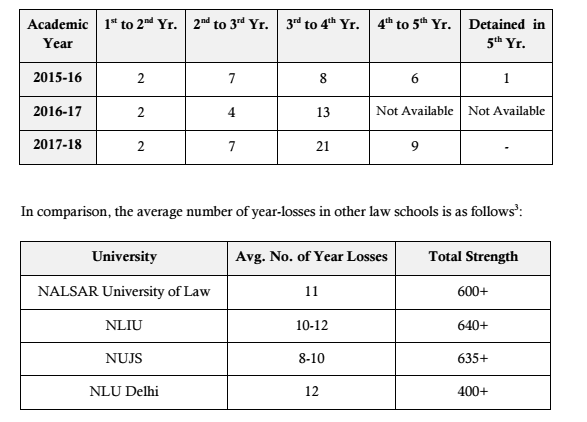Academic pressure mounts mental health crisis on NLSIU campus: SBA report
After a second suicide on its campus in two years rocked the National Law School of India University (NLSIU), Bangalore last month, its student body has compiled a shocking report of how academic pressure is brewing a mental health crisis among the students of India’s #1 law university.
The report prepared by the Student Bar Association (SBA) points out that the current graduating fifth year batch which started with 80 students has shrunk to 58 students today— two students committed suicide, five dropped out in the first two years and 14 others suffered year loss during the five year term. In short, the batch is three-fourth of its original size.
While 10 percent drops out in the initial years in every batch, several students suffer year-loss (detention caused by failure to pass exams) in successive years, the maximum in the third year. In academic year 2017-18, 45 of the 400 students, suffered year loss– the number of students who were detained were 2, 7, 21 and 9 in first, second, third and fourth year respectively.
More worrisome is that a significant percentage of students who suffered year loss once, ended up with repeated detentions. “The mental health of these students has been the most neglected crisis on this campus,” says the draft report.
“This state of affairs reveals the egregious systemic neglect of the mental health of a sizeable portion of the student population. The system of promotions at law school is like quicksand. It drags its victims into a never-ending abyss of repeated year-losses. It disadvantages those it should protect, above all. A cursory comparison with other universities clearly indicates that this system needs an immediate overhaul,” it says.
It’s also pertinent to note that majority of the students who suffer year losses are from marginalised communities – of the 45 who suffered year losses, 27 were students from reserved categories. “The system of promotion is defective…Those who find themselves entangled in this vicious cycle of repeated losses find it difficult to escape the loop. This may manifest itself in various forms of mental illness, driving students to the very edge,” says the report.
The self-introspective report also quotes two college counselors. “In case they falter in one trimester, there are possibilities of losing motivation due to mounting anxiety, which can lead to other mental health issues. The prospect of losing a year can be pain inducing… they go through a lot of shame, humiliation, loss of self esteem, self confidence etc. It is generally difficult for them to bounce back, which again depends upon their self resilience. They tend to isolate themselves; the prospect of sitting with juniors, losing friends who were batch mates doesn’t help either..,” says the college counsellor.
The hectic pace of the course schedule, need to participate in extra-curricular activities, the competitive nature of the institute, along with immense expectation from parents and friends and their own fear of failure in the residential campus creates conflicting emotions and self doubts.
Says another college counselor in the report, “Students who come to NLSIU are from various cities, big and small, but one thing that is common to most of them is that they have been toppers in academics in their respective fields. However once they come to NLSIU, the entire picture changes as they are now competing with students alike. Which means that they may not be toppers anymore which takes a huge hit on their self worth and self-esteem.”
The report also cites year loss figures from other prominent law schools. They range from 8-12 in NALSAR University of Law, NLIU, NUJS, NLU Delhi. (see table)

*From the NLSIU SBA Report
SBA submitted the report to the vice-chancellor on Thursday with recommendations and suggestions. “We have suggested building a more robust mental healthcare infrastructure on campus with additional college counselors, activities and programmes. We also recommend institutional reforms in the report. This includes removing attendance marks and also devising other means to lower the rate of detention. The authorities have expressed solidarity in tackling the problem,” a senior representative of SBA told EducationWorld.
Vice-chancellor R Venkat Rao, whose ten year tenure is ending in May, has not responded to EW’s messages and calls till the time of publishing.















Add comment